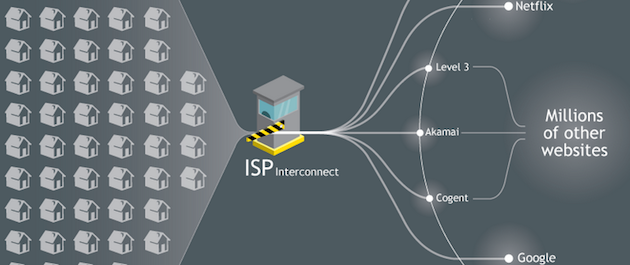Your ISP Is Probably Stupid
If you follow some of the net neutrality news, you probably know Internet Service Providers (ISPs) are dumb. If you don’t, this is a great time to help you understand how truly idiotic ISP’s are. I came across a war of words between Netflix’s Reed Hasting calling for net neutrality, and AT&T’s Jim Cicconi, calling for people to pay twice. While the idea Reed Hasting puts forth is reasonable, Jim Cicconi’s is all shades of stupid.
But, you know, they don’t have to expand capacity at all. Today, it’s Netflix, and tomorrow it might be some other new service that uses lots of bandwidth. The amount of data we get from our ISP doesn’t always coincide with what exists on the Internet – you’ll be very aware of this if you’re a rural user trying to stream the Olympics. Remember a time when everyone was on dial-up? When we wanted to use video conferencing, the quality sucked, so there was little that could be done (at least until we had more capacity). There will always be this tension between what we can get, and what we want. We simply pay the ISP for what we get, and we should be able to use all of it.
This seems to be a big push to add another tier to Internet services. If you use something that needs lots of bandwidth, you need to pay the ISP more for it. Even though you already paid for it. These extra payment tiers are being added all over, in the form of bandwidth caps and, now presumably a cost to giving Netflix a higher priority. Whatever service comes next and needs bandwidth, your ISP will scream and want to add a cost to that user too. We simply pay the ISP for what we get, and we should be able to use all of it.
There are analogies everywhere, but I like to think of a highway. This is a roadway that allows for a certain capacity of cars and no more. If we pay for the building of this road with our taxes (not a toll road) and decide we want to drive on it once a month, or 40 times in that month – do we pay more? No, we don’t. If the government sees that additional capacity is required, it may add more lanes, or they may not. It is in the Government’s interest to keep people happy by adding lanes, which they were probably paid for by taxes. We simply pay the Government for what we get, and we should be able to use all of it.
What are Jim Cicconi‘s arguments?
1. Increased bandwidth consumption causes us to invest in networks – You would think that was the simple business model of an ISP since the creation of ISPs.
2. Companies must build additional capacity to handle this traffic – Well, no they don’t. They often don’t and risk losing customers because of it. That happens.
3. We should accept the fact that AT&T must be ready to build additional ports and transport capacity to accept the new volume of capacity as a consequence of Netflix’s good business fortune – Uhm, capacity again? You build it or you don’t. You aren’t allowed to bitch about a particular Internet product’s success. What’s next, a surcharge for using Dropbox?
Then he hits us with some idiotic argument about how when Netflix was sending DVDs by mail, the cost of delivery was included in the price, and it was. Should this direct relationship also exist with ISPs? That is just insanely dumb. There is one postal service, and one mode of delivery. There are countless numbers of ISPs providing varying different speeds in many locations. The postal service is delivered with some certainty, the Internet is delivered with no certainty. Netflix should not be asked to have a direct (paying) relationship with every ISP.
He then says;
As we all know, there is no free lunch, and there’s also no cost-free delivery of streaming movies. Someone has to pay that cost.
Someone should send this guy an overpriced bill for Internet services. Surely someone has one of those. Oh, all of you do. Send that to him and help him understand that streaming movie has already been paid for (along with his salary). We simply pay the ISP for what we get, and we should be able to use all of it.


